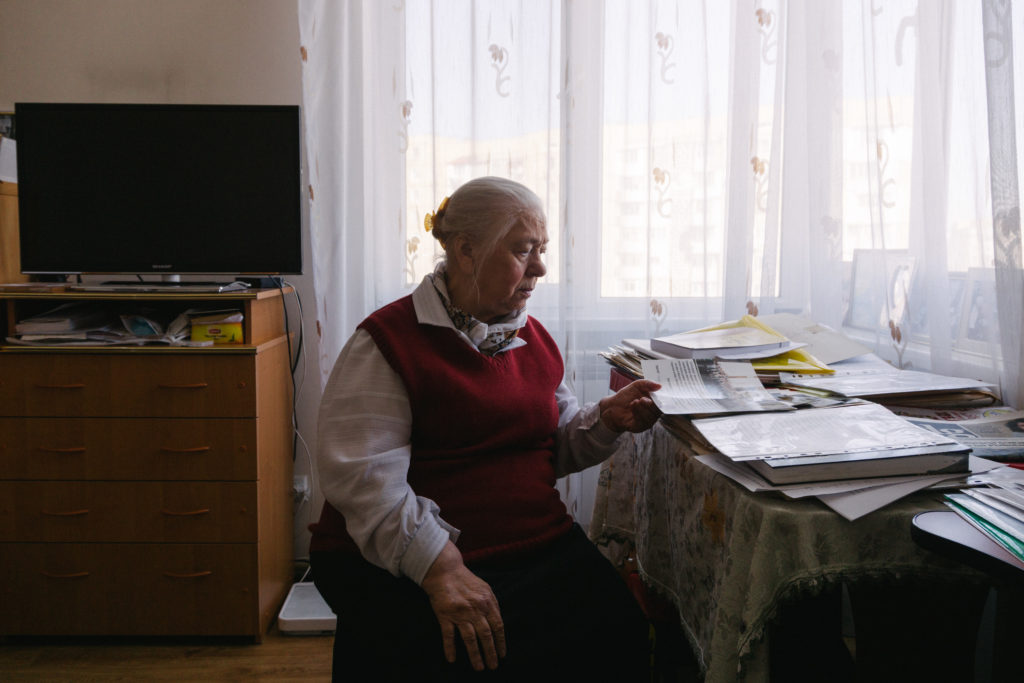Imagine a parliament of 380 deputies, of whom only 13 are women. Imagine that two of them shortly dropped out of office and only 11 left. This is not a fiction story, it is the case of the first independent Moldovan Parliament. “That was the Soviet Union. The women were given a gift on March 8th, and she was not appreciated anywhere else. Having no experience, women were not involved in the battle”, says Nadejda Brânzan, one of the few women who fought in the Parliament for a better future.
“People do not feel the freedom we fought for”
She was 42 years old when she decided to quit the position of Deputy Chief Doctor at the Rezina district hospital and to get involved in the socio-political life of the country. She wanted to be part of the movement that promoted Romanian values in the Republic of Moldova. “Gorbachev’s restructuring began in 1987. Here, in Bessarabia, some movements began, in the forefront of which, the intellectual elites of the time, especially the writers, began to promote the struggle for the language and for the alphabet. Having a high position, I felt like I wanted to get involved”, explains Nadejda Brânzan.
Enlarge

Ramin Mazur
She was never a member of the Communist Party or an activist of the then-system. Moreover, being a very good specialist in contagious diseases, she managed to maintain her important job as well. However, when she wanted something more, she understood that it was incompatible with her attempt to get involved in the fight for the Romanian language and alphabet. So she filed her resignation. “I started the movement in the first place with the rallies that took place in Chișinău, on Sunday especially. At first, they were held in the Great National Assembly Square. Then, the government got mad and we had to move to the “national valley”, as we used to call Valea Morilor”, the deputy tells us.
Shortly after, Nadejda Brânzan founded the Basarabia Club, which fought for the Romanian values in the Republic of Moldova. Through it, she managed to mobilize the people from all the neighboring villages. “Then everyone was different – active and interested in the issues of the national movement. People came regardless of the outside weather – whether it rained, it was snowing or it was sunny – we were in the Palace. Without paying anything. The local government, although it was communist, never forbid us to sit there. At the Great National Assembly, we could get 13 coaches. That’s how people mobilized themselves. Now, they are forced to artificial meetings. It is a completely different situation. The people do not feel the freedom that we fought for at that time. The current regime is way more dangerous than that from the past”, says Mrs. Brânzan with regret.
During the electoral campaign, the security services were following her tracks. The deputy’s team was investigated. “I was being watched, listened and searched in the house. They did everything. We’ve been through all this, but we were not afraid. Today I may be more cautious, but I do not think so. I had an idea I wanted to do. I wanted to see my people free, to speak their language, not to write our medical records in Bessarabia in Russian, but in Romanian. And finally, it had been done”, remembers the woman. At the Great National Assembly, kneeling and tearful, she voted for the Romanian language and the Romanian alphabet. Being short, she stood up to see how many people had gathered: “You could not see the end!”.
Enlarge

Ramin Mazur
1 out of 13
In the 1990 elections, she was elected in the constituency 283, Țareuca, to the detriment of two counter-candidates. Thus, she became one of the 13 women deputies in the First Parliament, and later she was elected chairwoman of the Committee on Women’s Affairs, Mother and Child Protection. She is one of the politicians who contributed to the writing of the Constitution of the Republic of Moldova and on 27 August 1991 signed the Declaration of Independence of the Republic of Moldova. At the initiative of Nadejda Brânzan, the first independent Moldovan Parliament was the first in the ex-Soviet area to adopt the UN Convention on the Rights of the Child. Thanks to her work, families with many children were given more land, and women working in harmful conditions have the right to retire five years earlier. She also showed courage outside the walls of the Parliament. “I was in Transnistria, during the war, without the knowledge of the leadership of the Parliament. I was there four times. The first time, I was in Dubăsari. I met Filip Lupașcu at Coșnița. We met there with colleagues who left Parliament. They were terrified”, recalls Nadejda Brânzan.
Enlarge

Ramin Mazur
Today, the gender statistics in Moldovan politics are more optimistic, but not satisfactory. However, the deputy is not a fierce supporter of the law on equal opportunities. “I want to say that it is not good to enroll women in the electoral lists just for the sake of gender equality. I want women to be active, to get out of the kitchen, to leave the haircuts and not let others solve their problems. Since 1994, it has been getting worse, our children and grandchildren have been forced out from the country. Grandparents live here and do not see their grandchildren, nor can they go to them. Is that normal? The woman must get involved if she has the feeling and the courage. Actually… it does not have anything with the courage. Now you can not be arrested for that, but they can find you some reasons for that”.



